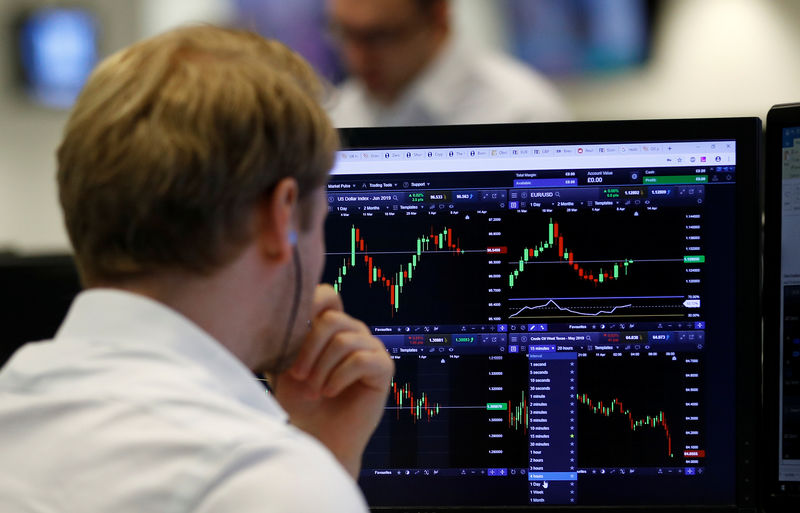By Sujata Rao, Danilo Masoni and Ritvik Carvalho
London (Reuters) - Even though Brexit is set for another delay beyond this month, investors still appear confident enough to start unwinding tens of billions of pounds worth of bearish bets against the pound and domestically-focused UK stocks.
With a "no deal" Brexit considered by markets to be off the table, some estimates of the scale of that portfolio rebalancing run to as high as a quarter of trillion pounds.
Markets wobbled after the UK parliament refused to approve Prime Minister Boris Johnson's withdrawal timetable, but a Brexit extension and even an election should not meaningfully change the equation for UK assets amid hopes 3-1/2 years of political uncertainty is ending - at least for now.
Sunil Krishnan, head of multi-asset funds at Aviva (LON:AV) Investors, said UK assets had been viewed as being in a "too-difficult box", meaning they were either shunned or "shorted" --sold with the aim of buying back at a lower price.
Now some of those short positions are being covered, he said.
"The skew of risks is marginally now toward the upside and that's an upside we haven't seen for a year," Krishnan said, adding that some of Aviva's absolute return funds had recently taken on sterling exposure versus the dollar.
"There are a lot of professional investors who haven't covered their positions and won't do that before we get 100% clarity on the Brexit outcome," Krishnan said.
HEAVILY GEARED
Overseas investors have especially avoided shares in sectors such as homebuilders and retailers that are heavily geared to the UK economy, but these have rallied around 5% since an Oct. 10 Brexit breakthrough and many analysts reckon they have further to go.
Similarly, the pound weakened almost 20% between the referendum and early October.
Graphic: UK mid-cap stocks hit highest in a year - https://fingfx.thomsonreuters.com/gfx/mkt/12/7673/7604/midcaps.png
Of late though, short pound positions have slipped to $5.8 billion, off this year's high of $7.8 billion, according to the Commodity Futures and Trading Commission, which is estimated to capture around 10% of outstanding market positions.
Graphic: In for a short squeeze? - https://fingfx.thomsonreuters.com/gfx/mkt/12/7674/7605/gbp_pos.png
But there is a lot more out there than speculative bets.
A Morgan Stanley (NYSE:MS) report estimates that if companies and asset managers unwind even a fraction of the currency hedges they had put in place to protect against pound weakness, sterling demand could spike to around £300 billion by year end.
Foreigners will have FX-hedged at least part of the £3.4 trillion they hold in British securities and some of this could be unwound, the bank calculated.
On the other hand, UK funds holding foreign assets might also need to buy sterling on a forward basis to offset the impact a firmer pound has on overseas investments.
While hedge ratios don't usually change quickly, a Brexit deal "may bring urgency to this process," Morgan Stanley told clients, advising buying sterling against the dollar.
NOT MUCH DOWNSIDE
Dean Turner, UK economist at UBS Wealth Management, also doesn't see too much downside for the pound even if an election is called and the withdrawal bill is pulled.
That's because an election will see the UK either exit the EU under the terms of Johnson's deal or hold a second referendum that could cancel Brexit altogether.
An orderly Oct. 31 Brexit would have lifted sterling to $1.35, but a delay will only push it to "mid-$1.20s to $1.32", Turner added. It trades at $1.2850 GBP=D3.
Graphic: Sterling still cheap - https://fingfx.thomsonreuters.com/gfx/mkt/12/7712/7643/gbp.png
Yet any euphoria may not last beyond a few months, given the reality of navigating life outside the EU will soon set in especially against a backdrop of trade wars and slowing world growth.
Focus will also likely turn to future trade ties with the EU once the transition period expires in Dec. 2020.
But for the time being investors seem ready to bet that the worst of the turmoil in the world's No.5 economy is drawing to a close.
Graphic: UK stock market valuations cheap versus peers - https://fingfx.thomsonreuters.com/gfx/mkt/12/7672/7603/valuations.png
UK-exposed shares are under-owned in portfolios and undervalued relative to peers - allocations to UK equities hit record lows of 7.46% last month, according to Copley Fund Research, which tracks more than 400 funds managing $800 billion in assets.
Before the referendum, allocations were around 9.2%.
Compare also the amount of shares in the FTSE 250 .FTMC that are out on loan, probably for shorting purposes - IHS Markit calculates the short loan value for the FTSE 250 at 1.63%, double the level for the FTSE 100 .FTSE, an index with more exporters and international firms.
That's down however from highs around 2%, hit in early-2019 when no-deal Brexit looked plausible.
Graphic: Short positions on UK stocks fall as Brexit nears - https://fingfx.thomsonreuters.com/gfx/mkt/12/7681/7612/shorts.png
A 5% rise in the FTSE 250 is likely once the path and timing of Brexit is clarified, analysts canvassed by Reuters broadly expect, especially given earnings expectations for domestic firms have recovered from a near-decade lows earlier this year.
Barclays (LON:BARC) advised clients to increase exposure to domestic companies, predicting they would benefit disproportionately. It also last week closed its long-held preference for UK-listed exporters.
Graphic: FTSE 250 versus FTSE 100 earnings - https://fingfx.thomsonreuters.com/gfx/mkt/12/7718/7649/Capture.png
